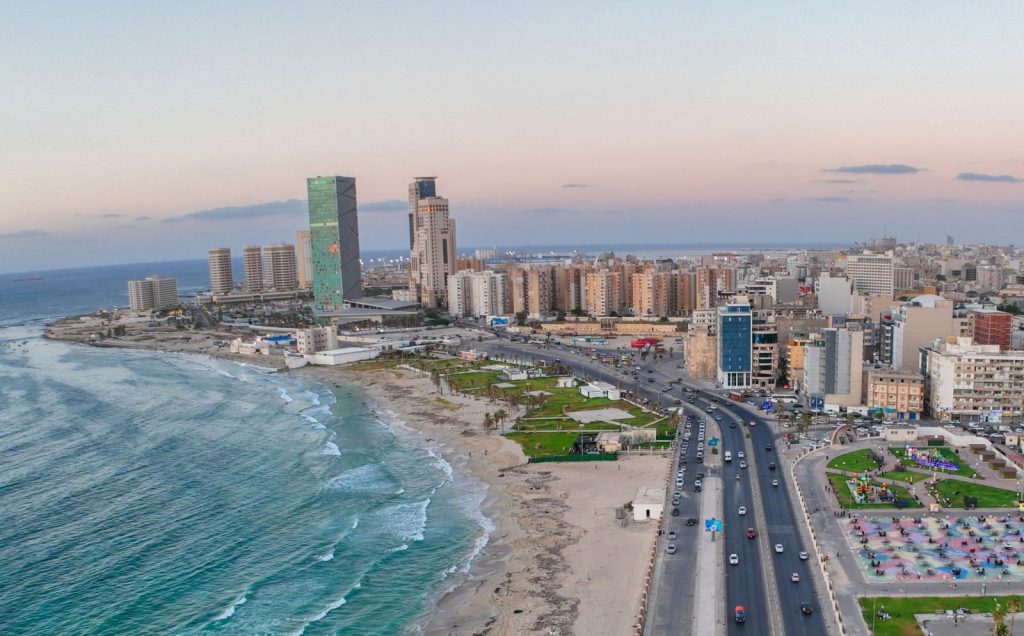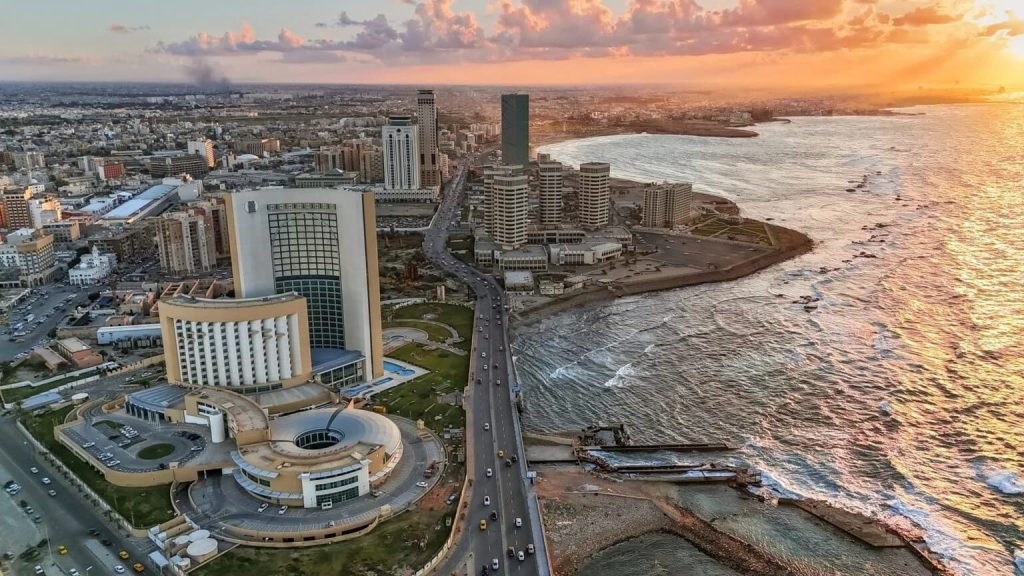The EU Blue Card offers a straightforward path for skilled Libyans to work in Europe. It provides access to the European job market, making it easier to secure employment across the EU.
This permit allows Libyan professionals to apply for roles that match their skills while meeting Europe’s demand for talent. Understanding the process and requirements is key to making the most of this opportunity.
Here’s what you need to know to start your career in Europe with the EU Blue Card.
Table of Contents

Understanding the EU Blue Card for Libyans
Navigating the process of obtaining an EU Blue Card enriches our understanding of its advantages. A precise insight into the card’s framework enables skilled Libyan professionals to make informed decisions.
What Is the EU Blue Card?
The EU Blue Card is a work permit designed for highly skilled non-EU citizens. It facilitates employment in EU member states, excluding Denmark and Ireland. Issued based on qualifications and a valid job contract, the card simplifies the process of living and working in Europe. With a minimum salary threshold requirement, the card ensures that applicants secure positions aligning with their expertise. Information from the European Union outlines the requirement of a degree or five years of professional experience in the relevant field.
Benefits of the EU Blue Card for Libyans
Libyan professionals gain several benefits from the EU Blue Card. These include access to quality employment opportunities, exposure to a multicultural environment, and potential for career advancement. The card enhances mobility within participating EU countries, reducing barriers to employment across borders. Family reunification rights ensure a supportive living arrangement for Libyan cardholders. The prospect of obtaining permanent residency after a specified period further incentivises skilled Libyans to explore job markets in the EU, contributing to both personal growth and economic development.
Eligibility Requirements for Libyans
Understanding the eligibility criteria for the EU Blue Card helps Libyan professionals streamline their application process.
Educational Qualifications
Applicants possess a recognised university degree. This degree should align with the job position offered in the EU.
Professional Experience
Minimum of five years of professional experience serves as an alternative to formal education. This experience must be relevant to the field of employment.
Employment Offer Requirements
A valid job offer or employment contract from an EU employer is essential. This contract should guarantee not only stability but also align with national labour regulations.
Minimum Salary Threshold
Meeting the minimum salary threshold set by the host EU member state is critical. This threshold varies between countries but typically stands at 1.5 times the average gross annual salary in the specific member state.

Preparing Your Application as a Libyan
Embarking on the application process for the EU Blue Card requires thorough preparation. By ensuring all necessary materials and documents are in order, our chances of a successful submission increase significantly.
Materials Needed
To begin preparing, gather essential materials that facilitate a smooth application process. These include a valid passport, academic certificates, and relevant professional references. For a more detailed overview, follow the specific guidelines provided by the EU member state of employment.
Documents to Gather
Compiling necessary documents is a crucial step in the EU Blue Card application process. Securement of a formal job offer is mandatory, along with academic credentials or proof of five years of professional experience. Additionally, ensure the employment contract meets the minimum salary requirement for the chosen country. This documentation provides the foundation for a robust application.
Translation and Certification Requirements
All documentation in non-EU languages must undergo translation and certification by authorised professionals. Certified translations ensure clarity and compliance with EU requirements. Engage reputable translation services to facilitate accurate conversion of documents. Certification validates document authenticity, supporting the credibility of our Blue Card application.

The Application Process
Applying for the EU Blue Card for Libyans involves several essential steps for Libyan professionals. Understanding each component is crucial for a successful application.
Finding an Employer
Securing employment is the initial step in obtaining an EU Blue Card. We recommend identifying companies that value highly skilled professionals and are familiar with the EU Blue Card process. Networking through industry events and platforms like LinkedIn can expand opportunities. Additionally, researching companies in sectors relevant to your expertise increases the likelihood of successful placement.
Applying for a Job
Applying for a job involves presenting tailored CVs and motivation letters. Highlight qualifications and relevant experience that match the position’s requirements, demonstrating value to potential employers and compliance with EU standards. Preparing for interviews, both virtual and in-person, is an integral part of this phase. We suggest familiarising ourselves with common interview practices in Europe to enhance our chances.
Submitting Your Application
Submitting the EU Blue Card application requires gathering specific documents. After securing a job offer, collect and prepare necessary documents, ensuring certified translations where needed. We should submit the application to the appropriate national authority within the destination country. Tracking the application status can provide peace of mind and help manage any subsequent steps or requests for additional information efficiently.
Attending the Interview
EU Blue Card applicants, particularly from Libya, should prepare to attend interviews as part of the job selection process. Mastering the interview significantly impacts the likelihood of obtaining employment.
Common Interview Questions
Preparing for potential interview questions boosts confidence. Common Interview Questions often centre around experience, qualifications, and motivation. Employers typically ask about previous work experience to assess its relevance to the role. Questions regarding qualifications allow applicants to demonstrate their expertise, while motivation-related inquiries explore interest in working within the EU. Additionally, questions about problem-solving abilities and adaptability in a multicultural environment encourage candidates to showcase their soft skills.
Tips for a Successful Interview
Effective interview preparation includes understanding the position and company. Researching the employer strengthens discussion points, showcasing genuine interest and preparedness. Practising responses to typical questions sharpens delivery and response time. Utilising mock interviews simulates the interview environment, providing practical feedback. Embracing the STAR (Situation, Task, Action, Result) method clarifies answers, articulate past achievements, and demonstrate problem-solving skills. Confidence and professionalism during the interview are critical, as they convey competence and reliability to potential employers.

Receiving the EU Blue Card for Libyans
After successfully navigating the application process, Libyan professionals look forward to receiving their EU Blue Card. Understanding the timeline and subsequent steps ensures a smooth transition.
Timeline for Decision
Member states typically take 30 to 90 days to process EU Blue Card applications once submitted. The exact duration depends on the individual country’s administrative procedures and caseload. During this period, authorities assess all submitted documents and verify compliance with eligibility criteria.
Next Steps After Approval
Upon approval, the next step involves collecting the EU Blue Card from the designated location, often an immigration office or consulate, depending on the member state. It’s important to check local requirements for document verification at the point of collection. Additionally, securing accommodation and integrating into the local community can enhance adaptation and facilitate a smoother start in an EU country. Family reunification is also possible, allowing family members to join and reside with the cardholder under specific conditions, promoting personal stability alongside professional pursuits.
Common Issues and Troubleshooting
Navigating the EU Blue Card process may present challenges for Libyan professionals. Addressing these issues promptly can increase the likelihood of a seamless experience.
Addressing Rejection
Receive a rejection from the EU Blue Card application and act to understand the reasons. Investigate specific causes outlined in the rejection letter, which may include insufficient documentation or not meeting salary thresholds. Review the requirements carefully and gather any additional information or documentation needed. Engage with legal professionals specialising in immigration if necessary to gain further clarity and strengthen your subsequent application.
What to Do If Your Blue Card Expires
Monitor the expiry date of your EU Blue Card by ensuring awareness of its validity period. Begin the renewal process several months before the expiration to avoid lapses. Obtain a new employment contract or verification of continued employment with your current employer and meet any updated salary thresholds. Check with local authorities for any additional requirements. Filing a renewal application promptly minimises any disruption to your employment status.
Switching Employers
Changing employers with an EU Blue Card requires following specific procedures to maintain status. Notify relevant migration authorities in the EU member state promptly. Secure a new job offer that meets the Blue Card criteria, ensuring the position and salary align with local regulations. Submit the necessary documents, including a new contract, to avoid any legal issues. Ensure compliance with all regional policies to facilitate a smooth transition between employment positions.

Conclusion
The EU Blue Card presents a promising opportunity for Libyan professionals seeking to advance their careers in Europe. By understanding the application process and meeting the eligibility criteria, skilled individuals can unlock a pathway to quality employment and cultural enrichment. Our comprehensive guide aims to equip Libyan applicants with the knowledge and tools needed to navigate the complexities of the EU Blue Card application successfully. As we embrace these opportunities, let’s remain proactive and diligent in our preparations to ensure a smooth transition into the European job market.
Frequently Asked Questions
What is the EU Blue Card?
The EU Blue Card is a work permit for highly skilled non-EU citizens, enabling them to live and work in most EU countries. It offers a streamlined process for employment, promoting both career advancement and personal growth.
Who qualifies for an EU Blue Card?
To qualify, applicants must have a recognised university degree or five years of professional experience relevant to the job. They need a valid job offer from an EU employer, with a salary meeting the minimum threshold set by each country.
What benefits does the EU Blue Card provide to Libyans?
The Blue Card offers Libyans quality job opportunities, enhanced mobility within the EU, and potential for permanent residency. It also grants family reunification rights, providing a stable foundation for living and working in Europe.
How should Libyans prepare for the Blue Card application process?
Preparation involves compiling vital documents like a passport, academic certificates, and job offer letters. Certified translations are necessary for non-EU documents. Thorough preparation increases the application’s credibility and success chances.
How long does it take to process a Libyan Blue Card application?
The processing time for a Blue Card application varies but typically ranges from 30 to 90 days, depending on the EU member state’s procedures and workload.
Can Libyans switch employers while holding a Blue Card?
Yes, Blue Card holders can switch employers. However, they must inform migration authorities and secure a new job offer that complies with Blue Card requirements to maintain their status.
What should Libyans do if their Blue Card application is rejected?
In case of rejection, review the rejection letter to understand the reasons. Address these issues, gather the necessary documents, and consider resubmitting the application. Understanding feedback is crucial for a successful resubmission.
How can Libyans find job opportunities in Europe for the Blue Card?
Networking is key. Attend industry events, use platforms like LinkedIn, and connect with employers who value skilled professionals and understand the Blue Card process. Tailoring CVs and motivation letters can enhance job prospects.
What is essential for interview preparation for the EU Blue Card for Libyans?
Research the employer, practise responses to common questions, and utilise the STAR method for articulating experiences. Confidence and professionalism during the interview can significantly impact success in securing a position.




